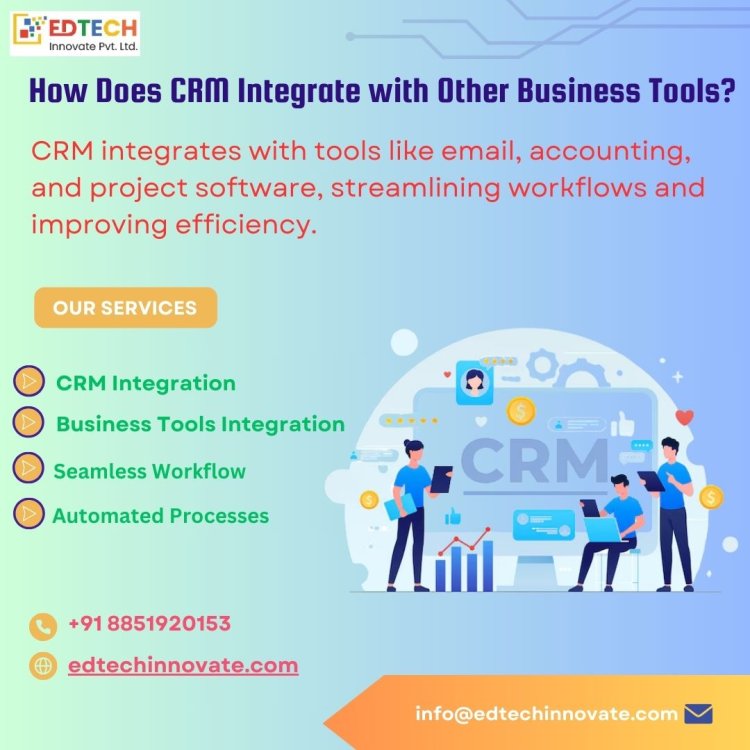Boost Productivity with Seamless CRM Integrations
Boost productivity with seamless CRM integrations that connect email, accounting, and support tools, streamlining operations and enhancing customer experiences.

Customer Relationship Management (CRM) software has become a cornerstone of modern business strategies, helping companies efficiently manage customer interactions, streamline processes, and boost sales. However, the true power of a CRM system is unlocked when it integrates with other business tools. This integration provides a seamless flow of data, automates tasks, and enables businesses to work smarter. In this article, we will explore how CRM integrates with various business tools and the benefits it brings to organizations.
What is CRM Integration?
CRM integration is the process of connecting a CRM system with other business applications and tools to ensure they work together smoothly. By linking CRM with platforms like email marketing software, accounting tools, and social media management systems, businesses can streamline operations, improve data accuracy, and enhance customer experiences. CRM integration helps eliminate data silos and allows for real-time sharing of information across departments.
Key Business Tools CRM Integrates With
- Email Marketing Platforms
Email marketing is a vital aspect of customer engagement. When CRM integrates with email marketing platforms like Mailchimp, Constant Contact, or ActiveCampaign, businesses can send personalized campaigns based on customer data stored in the CRM. This integration allows for automated email segmentation, lead nurturing, and tailored communication that improves customer engagement and conversion rates. - Accounting and Financial Software
Customer Relationship Management integration with accounting tools such as QuickBooks or Xero allows businesses to link customer information with billing, invoicing, and payment records. This helps streamline the financial management process and ensures that financial data is accurate and up to date. For example, a CRM system can automatically generate invoices based on customer purchases or manage recurring billing for subscription-based businesses. - Project Management Tools
Businesses that manage multiple projects need to ensure smooth coordination between teams. By integrating CRM with project management software like Trello, Asana, or Monday.com, businesses can link customer data to project tasks and timelines. This allows teams to track progress, manage resources, and ensure that customer needs are met in a timely manner. CRM integration enables better communication and collaboration across departments. - Customer Support Software
Integrating CRM with customer support platforms like Zendesk, Freshdesk, or ServiceNow enables support teams to have immediate access to customer history and interactions. This unified approach ensures that support agents can provide quick, personalized responses, improving overall customer satisfaction. CRM integration also helps in tracking customer inquiries, managing service tickets, and resolving issues efficiently. - Social Media Tools
Social media is an essential channel for businesses to engage with customers. CRM integration with social media management tools such as Hootsuite or Buffer allows businesses to track social media interactions, analyze customer sentiment, and respond quickly to customer queries. By linking CRM with social media platforms, businesses can manage their online reputation, increase engagement, and gain valuable insights into customer preferences.
Benefits of CRM Integration
- Improved Efficiency
Best CRM system examples for businesses integration automates many manual tasks, such as updating customer information, sending follow-up emails, and generating reports. This frees up time for employees to focus on high-value activities like nurturing leads and closing deals. Automation also ensures that tasks are completed consistently and on time, leading to improved operational efficiency. - Enhanced Customer Experience
When CRM integrates with other business tools, employees gain access to a complete view of customer interactions across various touchpoints. This 360-degree view enables businesses to personalize communication, offer tailored products or services, and resolve issues quickly, leading to a better overall customer experience. - Better Data Accuracy
Manual data entry and siloed systems can result in errors, inconsistencies, and data duplication. CRM integration ensures that all business tools share the same up-to-date data, improving the accuracy of customer information. This allows businesses to make informed decisions based on reliable data, reducing the risk of costly mistakes. - Scalability
As businesses grow, so do their needs. CRM integration makes it easy to scale operations by adding new tools or software systems that seamlessly connect with the existing CRM. This flexibility ensures that businesses can continue to evolve without disrupting their processes or losing customer data.
Conclusion
Integrating CRM with other business tools is essential for businesses looking to optimize their operations, improve customer relationships, and stay competitive. By syncing CRM with email marketing, accounting software, project management tools, and customer support platforms, businesses can automate tasks, improve collaboration, and provide a better customer experience. Ultimately, CRM integration leads to greater efficiency, data accuracy, and scalability, enabling businesses to meet the needs of their customers while driving growth.
What's Your Reaction?



















